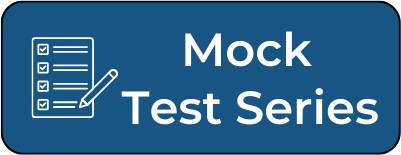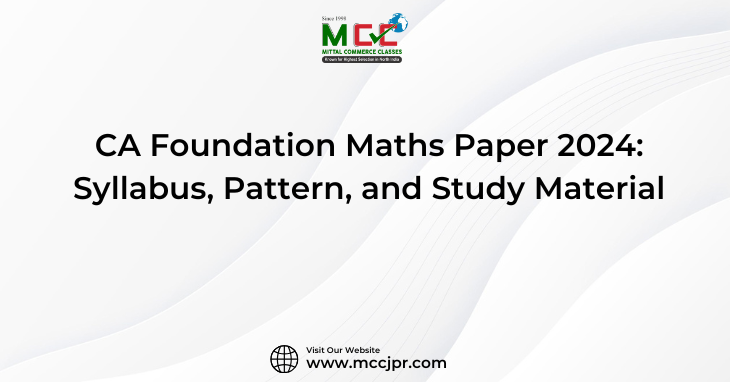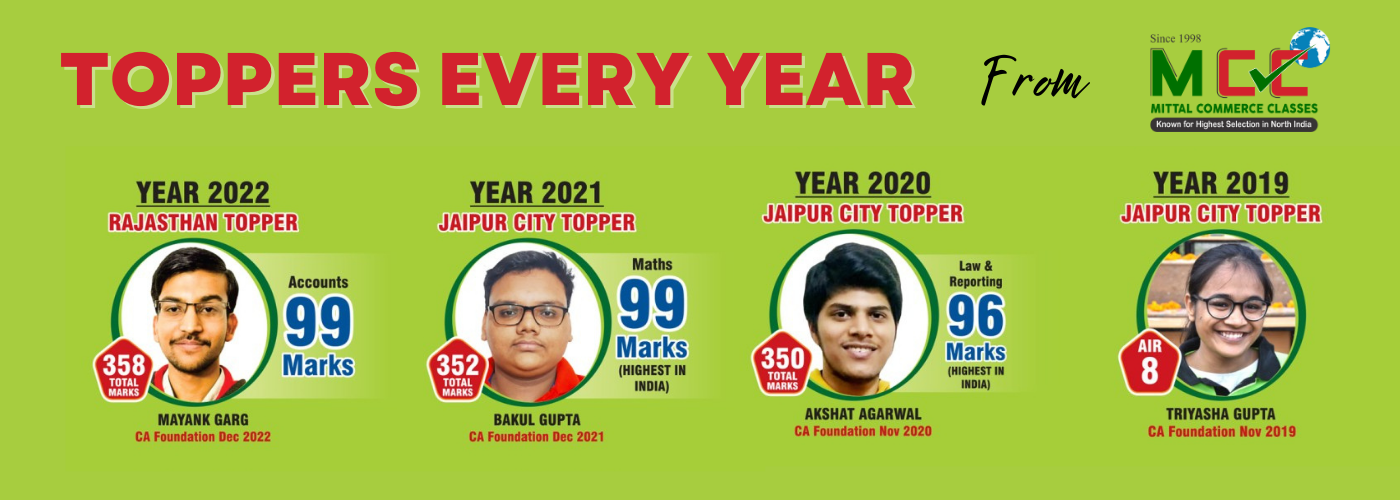Introduction
Identifying the Subject Matter Content:
The objective of the CA Foundation Maths syllabus is to evaluate your understanding of fundamental mathematical concepts. Moreover, it includes concepts including statistics, algebra, arithmetic, and commercial mathematics. Each subject has significance and demands an in-depth understanding for an adequate mathematical foundation.
Analyzing the Pattern
It is crucial to get familiar with the structure of the test and effectively organize it. Additionally, the CA Foundation Maths paper usually includes objective-type questions that urge you to figure out puzzles employing mathematical concepts. Understanding the relative importance of each topic will enable you to organize your study schedule appropriately.
What more in the CA Foundation Math exam pattern:
(i) Objective Type question paper
(ii) Paper Duration- 2 hours
(iii) Overall paper mark- 100
(iv) required marks- 40%
Must Read: ICAI CA Foundation New Syllabus 2024
Relevant Concepts in CA Foundation Maths Paper
Commercial Mathematics: The following topic contains topics such as collaboration, discounting, and fascination. Additionally, accomplishment hinges on your capacity to implement these concepts in real-life situations.
Statistics: The following material contains a dispersion of variance indicators of the center of gravity and likelihood. Furthermore, to effectively solve problems in this area of study, individuals must have an excellent grasp of maths and statistics principles. Moreover, they need expertise with real-world data.
CA Foundation Quantitative Aptitude Study Material
Part-A: Business Mathematics |
Part-B: Logical Reasoning |
Part-C: Logical Reasoning |
| Chapter 1: Ratio and Proportion, Indices, Logarithms | Chapter 9: Number Series, Coding and Decoding, and Odd Man Out | Chapter-13:
Unit 1: Statistical Representation of Data, Diagrammatic representation of data, Frequency distribution, Graphical representation of Frequency Distribution –Histogram, Frequency Polygon, Ogive, Pie-chart. Unit:2 Sampling: Basic principles of sampling theory, comparison between sample survey and complete enumeration, some important terms associated sampling types of sampling, sampling and non-sampling errors. |
| Chapter 2: Equations and Matrices
Unit I: Equations Unit II: Matrices |
Chapter 10: Direction Tests | Chapter 14: Measures of Central Tendency and
Dispersion: Measures of Central Tendency and Dispersion: Mean Median, Mode, Mean Deviation, Quartiles and Quartile Deviation, Standard Deviation, Co-efficient of Variation, Coefficient of Quartile Deviation |
| Chapter 3: Linear Inequalities | Chapter 11: Seating Arrangements | Chapter 15 : Probability: Independent and
dependent events; mutually exclusive events. Total and Compound Probability and Bayes’ theorem |
| Chapter 4: Mathematics of Finance
Simple Interest, Compound interest, Nominal and Effective Rate of Interest, Present Value, Net Present Value, Future Value, Perpetuity, Annuities, Sinking Funds, Calculating of EMI, Calculations of Returns: Nominal and Effective Rate of Return, Compound Annual growth rate (CAGR) |
Chapter 12: Blood Relations | Chapter 16: Theoretical Distributions: Random
variables, Discrete and Continuous Random variables, Expectation of a discrete random variable, Theoretical VI 25%-30% Distributions: Binomial Distribution, Poisson distribution – basic application and Normal Distribution – basic applications |
| Chapter 5: Basic Concepts of Permutations and Combinations Basic Concepts of Permutations and combinations: Introduction, the factorial, permutations, results, circular permutations, permutations with restrictions, Combinations with standard results |
Chapter 17: Correlation and Regression: Scatter
diagram, Karl Pearson’s Coefficient of Correlation Rank Correlation, Regression lines, Regression equations, Regression coefficients |
|
| Chapter 6: Sequence and Series – Arithmetic and Geometric Progressions
Relationship between AM and GM and the Sum of n terms of special series and Business Applications |
Chapter 18. Index Numbers: Uses of Index
Numbers, Problems involved in construction of Index Numbers, Methods of Construction of Index Numbers. BSE SENSEX and NSE |
|
| Chapter 7: Sets, Functions and Relations
Basics of Limits and Continuity Functions |
||
| Chapter 8: Basic Applications of Differential
and Integral calculus in Business and Economics (Excluding the trigonometric applications) |
Obtaining CA Foundation Study Materials:
Exposure to excellent instructional resources is a must for successfully passing the CA Foundation Maths exam. Furthermore, to assist with your planning, you’ll find an array of resources readily available, namely online classes, study guides, and monographs. Additionally, by utilizing the CA Foundation Mock test papers, you can assess your accomplishments and identify topics that require function.
Online courses are increasing in prominence as an alternative to studying for examinations in the modern digital age. Additionally, the CA Foundation online classes present you with the ability to learn at your own pace as you receive expert guidance from the ease of your residence. Moreover, engaging in interactive classes and online seminars could enhance your understanding of complex mathematical concepts.
Some Advice for Efficient Preparation:
1. Develop a Study Schedule: Setting up certain hours each day for preparing for CA Foundation Maths to ensure ongoing growth.
2. Regular Practice: Acquiring mathematical principles demands regular practice. To get acquainted with the exam structure, review the prior year’s examination papers and the CA Foundation mock test papers.
3. Seeking a rational explanation: Whether you’re experiencing concerns or having difficulty comprehending anything that we do, never hesitate to inquire with your instructors or other pupils for clarification. Moreover,
4. Remaining Concentrated and Fueled: During the entire preparation procedure, have a positive mindset and maintain dedication. Furthermore, develop realistic goals while appreciating the improvements you make as you go.
CA Foundation Exam Structure and Syllabus for 2024
First things first, as per the ICAI’s recent announcement, CA Foundation Exams will start from 20 June 2024 to 26 June 2024. Now, let’s delve into the paper pattern.
Papers 1 and 2: Each paper holds 100 marks and is composed of objective-style questions. In these exams, applicants will have to respond to questions with multiple choices.
Paper 3: Having a total of 100 marks, the examination contains questions of a subjective nature. Furthermore, it is broken down into three parts: 40 marks for Business Mathematics, 20 marks for Logical Reasoning, and 40 marks for Statistics.
Paper 4: Comparably, this 100-mark paper is subjective in traits.
Passing Conditions of the CA Foundation 2024 Exam
To be eligible to succeed on the CA Foundation Exam in 2024, candidates are required to meet a number of criteria. Additionally,
Important Points to Think About:
CA Foundation Subject Breakdown
To assist learners in understanding the subject matter more effectively, the CA Foundation syllabus for 2024 has been separated into four subjects. Now let’s examine each topic in greater depth:
Paper 1: Accounting:
This course offers a background of accounting principles. Moreover, it includes the preparation of financial statements, along with the performance of fundamental accounting operations.
Paper 2: Business Laws:
Throughout seven chapters, applicants study several legal structures that apply to businesses, with an emphasis on communicating effectively in a business setting.
Paper 3: Quantitative Aptitude:
This paper is further divided into three sections: Statistics, Logical Reasoning, and Business Mathematics. Additionally, each section carries equal weight in the examination. These subsections, which constitute a total of 18 chapters, cover a wide range of logical and mathematical ideas that are critical to business operations.
Paper 4: Business Economics:
This course explores how economic theories are applied in real-world company settings. It offers insights into many aspects of economics and business understanding in ten chapters.
The Best CA Foundation Coaching
Conclusion
Frequently Asked Questions
Q-1. When will the CA Foundation Exam 2024 begin?
As per the ICAI guideline, the CA Foundation Exam will be conducted from 20 June to 26 June 2024. For more updates check out ICAI Official Website.
Q.2. How Many subjects are in the CA Foundation?
According to the New CA Foundation Syllabus there are 4 subjects.
Q.3. Does Mittal Commerce Classes provide online classes?
Yes, MCC provides online and offline classes for CA Foundation, Inter and final.
Q.4. How Many Marks are required to pass the CA Foundation Exam?
Well, Each paper contains 100 marks; therefore, students need to attain 40% marks each. Moreover, they should aim for an overall score of 200 marks out of 400.












